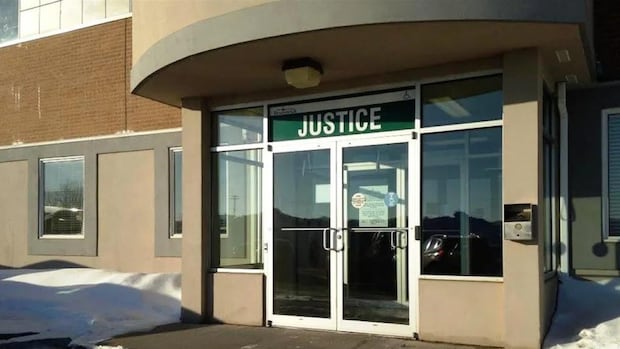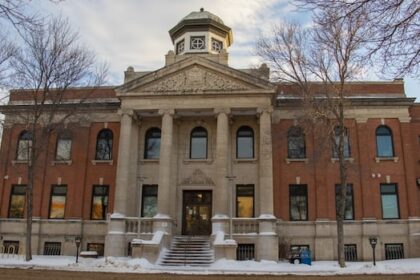New BrunswickThe New Brunswick Court of Appeal says the closure of provincial courthouses in Caraquet and Tracadie did not violate constitutional language rights of francophone residents and the provincial government is not obligated to revisit the decision.New Brunswick Court of Appeal reverses lower court decision that ordered province to revisit closuresJacques Poitras · CBC News · Posted: Sep 04, 2025 2:16 PM EDT | Last Updated: 1 hour agoThe provincial government reduced the Tracadie courthouse to a satellite operation in 2022. The court was one of two at the heart of a legal dispute about language rights and the justice system in New Brunswick. (Serge Bouchard/Radio-Canada )The New Brunswick Court of Appeal says the closure of two provincial courthouses on the Acadian Peninsula did not violate constitutional language rights of francophone residents and the provincial government is not obligated to revisit the decision.The province closed court facilities in Caraquet at the end of 2021 and reduced the Tracadie court to a satellite operation in 2022, with all cases transferred to Bathurst.A forum of peninsula mayors argued the closures violated sections of the Charter of Rights and Freedoms that guarantee the rights of anglophone and francophone New Brunswickers to their own educational and cultural institutions.The court ruling says that guarantee in Section 16.1 of the Charter does not extend to courthouses.”Courts are not ‘distinct institutions’ within the meaning of S. 16.1,” Justice Denise LeBlanc wrote in her ruling, as part of a three-judge panel.LeBlanc wrote that a Court of King’s Bench justice who ruled in favour of the mayors had not established a link between those rights and the arguments made by the mayors.The provincial courthouse in Caraquet closed three years ago. The New Brunswick Court of Appeal has now decided that the closure did not violate constitutional language rights. (René Landry/Radio-Canada)She also noted that residents of the Acadian Peninsula “will continue to have access to judicial services in French, although they will now have to travel a greater distance by car.”The decision lists 22 communities that saw courthouse closures since 1992 and points out that “the impact of most of these closures was felt within the English linguistic community of New Brunswick.”Caraquet Mayor Bernard Thériault, president of the forum of mayors, told Radio-Canada that lawyers were reviewing the ruling but his preference was to end the court battle and talk to the province about re-establishing court services in at least one peninsula community.”I’d prefer a dialogue with the province to an appeal on our part,” he said, adding that he had already received “signals” from Premier Susan Holt’s Liberal government that officials were open to discussions.In a statement, the province said it was having “constructive” discussions with the mayors in good faith, but would have to put that on hold if the ruling were appealed.Caraquet Mayor Bernard Thériault, president of the forum of mayors, said that lawyers were reviewing the ruling. (Radio-Canada)The closures were made by the previous Progressive Conservative government of Blaine Higgs.It argued the number of cases being heard in Caraquet and Tracadie was declining and it was a more efficient use of resources to centralize court services in Bathurst.Evidence in the case filed by the province showed that wait times for trials had been reduced and there were fewer cancellations as a result of the centralization.But the forum of mayors argued that — along with the inconvenience for local police, defendants and others of travelling to Bathurst for court appearances — the move did not consider francophone rights.In April 2024, Court of King’s Bench Justice Christa Bourque agreed.She did not order the courthouses reopened but ordered the government to reconsider its decision in light of the constitutional and language concerns she raised. She said there was “a positive connection between the closure of a courthouse and the protection, preservation and development of a minority language community,” calling a courthouse “a symbol” of the rule of law and the protection of rights. But the Court of Appeal said Bourque “did not explain how the minister’s decision would have created an inequality of status, rights or privileges between the English and French linguistic communities in New Brunswick.”The appeal ruling says the Charter “does not guarantee the absence of geographical obstacles, nor unlimited access to local judicial services at all times.”ABOUT THE AUTHORJacques Poitras has been CBC’s provincial affairs reporter in New Brunswick since 2000. He grew up in Moncton and covered Parliament in Ottawa for the New Brunswick Telegraph-Journal. He has reported on every New Brunswick election since 1995 and won awards from the Radio Television Digital News Association, the National Newspaper Awards and Amnesty International. He is also the author of five non-fiction books about New Brunswick politics and history. With files from Alix Villeneuve
Caraquet, Tracadie court closures didn’t violate language rights, panel rules











